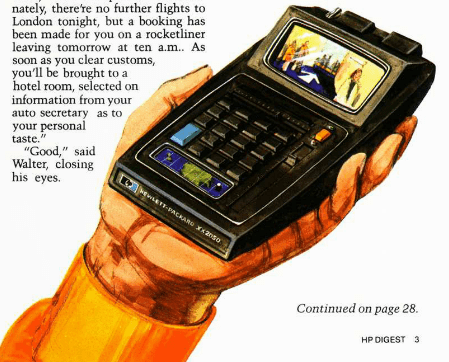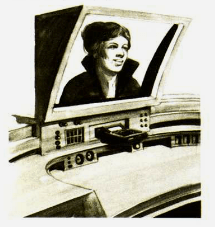Back in 1979, I laid hands on a personal computer for the first time in my life. It was a Commodore PET, and the forward-looking math teacher in my middle school had arranged for the purchase of a few of the machines.
During the same year, Hewlett Packard paid a well-known science fiction writer to compose an original story for HP Digest magazine about what the HP calculator would be like in the year 2050. This came to my attention because a business associate of mine emailed me the PDF of the file, since he and I got into computers around the same time. I wanted to let you see a copy too, and although It took some digging, here it is.
What’s amazing to me is that in 2013, a full 37 years before the fictional story’s setting, almost all of the predictions with respect to the handheld electronic device (described as the HP-XX2050 in the story) have been true for a while already. (Although we’re still flying around in jets with technology from the 1960s, instead of the sub-orbital rocket liner cited in the story). Here are some excerpts from the pieces, in the order of their appearance, along with my comments about their modern-day equivalents:
 + “A soft musical tone sounded from his portfolio. Walter opened it and fished out an instrument looking like a slim, handheld calculator.” – well………ringtones, I guess. Although, let’s face it, product design has mercifully graduated from the sensibilities of the mid-1970s. The illustration shown here was seriously what a product from 2050 was supposed to look like. Which, oddly, looks exactly like a 1970s calculator with a little video screen slapped on top.
+ “A soft musical tone sounded from his portfolio. Walter opened it and fished out an instrument looking like a slim, handheld calculator.” – well………ringtones, I guess. Although, let’s face it, product design has mercifully graduated from the sensibilities of the mid-1970s. The illustration shown here was seriously what a product from 2050 was supposed to look like. Which, oddly, looks exactly like a 1970s calculator with a little video screen slapped on top.
+ “As soon as the heat of his hand enfolded it, the tone stopped, and the instrument…spoke to him. ‘What can I do for you, Walter?” – Smartphones certainly have the ability to support biometrics and speak to us now. And Siri is just one example of a anthropomorphic digital assistant.
+ “Tell me, do you see any tie-in computer consoles near you?” – Well, they pretty much missed the whole WiFi thing, I guess. Even in 2050, the world was supposed to be in such a state that you had to track down a hard-wired “tie-in” somewhere in order to communicate with anything else.
+ “Walter looked down and saw an image of the corridor on the screen of the XX2050 – with a glowing arrow picture as lying on the floor just before him. As he stepped forward, the arrow moved ahead of him, pointing the way he should go.” – Google Maps. And all the other map apps out there. Plus GPS, which didn’t even exist until the Gulf War.
+ “[The female voice said] ‘Slot me, Walter’……….he fumbled it out and slid it into the slot provided. The screen lit up with the smiling face of a young lady.” – Ummm, setting aside the innuendo, we are again once reminded of the inconvenience of having to find a “slot”.
+ “It wound up with an electronic note to itself to wake Walter” – Siri saves the day again; I use the Reminders function on my iPhone all the time.
+ “Ordinarily, Walter did not see a piece of paper from one year’s end to the next, any  more than he normally had to deal personally with the multitude of government and other forms” – Well, they got this kind of wrong. I have a funny feeling every person reading this as seen a piece of paper sometime in the past year. There’s more paper in the world than ever before. Sure, we use Turbotax instead of printed documents from the post office, but still, the notion of a paperless world didn’t happen.
more than he normally had to deal personally with the multitude of government and other forms” – Well, they got this kind of wrong. I have a funny feeling every person reading this as seen a piece of paper sometime in the past year. There’s more paper in the world than ever before. Sure, we use Turbotax instead of printed documents from the post office, but still, the notion of a paperless world didn’t happen.
+ “It did this by interlocking with the large, established computer nets wherever it happened to be, just as it had here in Jakarta” – Hello, Internet! (Even in “exotic” locales like far-off Indonesia).
+ “It could, if necessary, also have directed him to the computer terminals by voice directions” – Google Maps and voice synthesis, both on your phone and in your car.
+ “In its slim shape it possessed a gigabyte of memory power.” – Well, goodness, you can get thirty-two times this amount of “memory power” for seventeen bucks on a thumb drive.
I guess the biggest takeaway from this little story for me was just how far we’ve come since I first tried a computer myself. A lot of futurists tend to overshoot the future, predicting Martian colonies by 1970 and nuclear-powered rocket-cars soon thereafter. But, at least in the realm of computers and connectivity, we have arrived at the future decades ahead of schedule.

